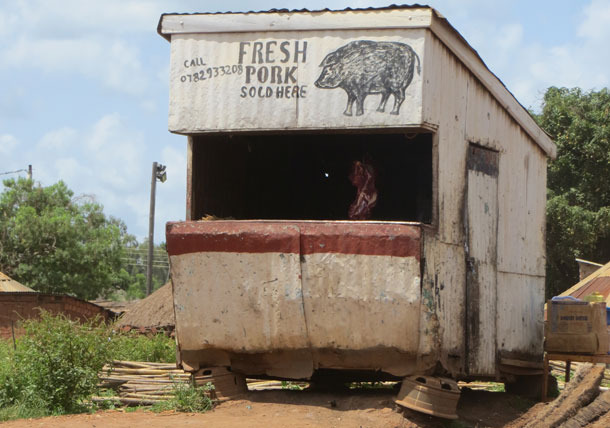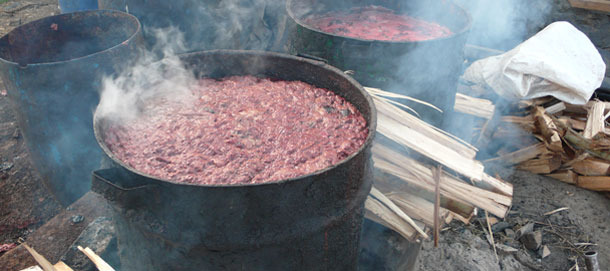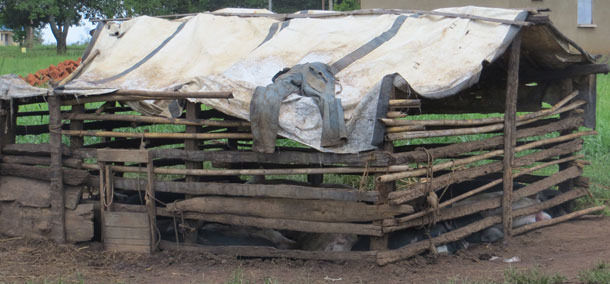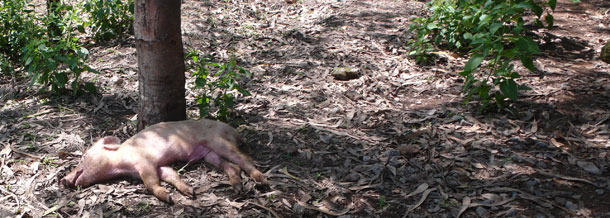African swine fever (ASF) is considered one of the most dreaded diseases of swine. Although currently confined to Africa, Eastern Europe and the Italian island of Sardinia, the disease continues to spread, seriously threatening previously unaffected countries. Unlike for most other transboundary animal diseases (TADs), no vaccines or drugs are available to prevent or treat ASF infection. Therefore, it is particularly important that ASF-free areas are maintained free through strict prevention and control measures. Measures can be taken at the institutional or at the individual level, e.g. the farmer, the middleman, the butcher, etc. The following is a summary of those measures, which can be summarized in one word: biosecurity. In order to understand what measures will be most effective, it is key to bear in mind that ASF spreads mainly through the movement of infected pork and other animal products, as well as live animals, which includes wild boar. The measures below are listed in chronological order from the times when the infection is not present and needs to be prevented, to the actions that are needed when the disease is already in the country. Biosecurity, in any case, always applies.


Butcher in Gulu, Uganda
Risk analysis and import/export procedures: Prevention of ASF entry to free countries depends on stringent policies for the safe importation of swine and risky products. i.e. pork and pork products, semen, hides, etc. The OIE Terrestrial Animal Health Code provides detailed guidelines. Regulatory and quarantine services should be equipped to effectively intercept foodstuffs and other risk materials at international airports, seaports and border crosses. Confiscated risk materials should be destroyed or disposed, and not dumped where it can be accessed by scavengers (animals and humans). Past events suggest that particular attention should be paid when disposing of waste food from aircraft, ships or vehicles from infected countries.
Swill feeding: Swill feeding is a very high risk route of introduction of several diseases into healthy populations. An effective ban on swill feeding would be ideal, but compliance at household level is unlikely, since it would defeat one of the main motivations for keeping pigs, i.e. minimum feed inputs thanks to swill feeding or scavenging. In any case, pigs should not be fed swill that might contain pork, and swill should be boiled for 30 minutes.

Boiling of swill before feeding to the pigs at a semi-commercial farm in Kiambu, Kenya
Containment of pigs: The construction of pig sties under hygienic conditions should be encouraged. Also, perimeter fencing will prevent the spread of disease from domestic pigs to wild boar (and feral pigs) and vice versa. Authorities should discourage pig production systems based on scavenging, which allows pigs to access potentially infected garbage and contact with wild boar. However, as with swill feeding, traditional ways of keeping pigs will not easily change, as many producers will not find it worthwhile to confine (and feed) their pigs.

Example of poor housing in Uganda

Improved pig sties in Kiambu, Kenya
Cleaning and disinfection: Equipment and premises should be periodically cleaned and disinfected. Organic matter should be cleaned from sheds, equipment, vehicles, etc. before disinfection. Vehicles and personnel (shoes, equipment, etc.) should be disinfected on entering and leaving farms. Proven effective disinfectants include detergents, hypochlorites, alkalis and glutaraldehyde. Equipment that cannot be easily disinfected should be exposed to sunlight.
Other biosecurity measures: Visitors kept to a minimum, pig-loading and unloading outside the perimeter fences, and cleaning and disinfection of pig-carrying trucks after unloading. Village settings where pigs roam freely are particularly challenging, but the same biosecurity principles apply. Sharing of equipment among farms/villages should be discouraged without previous proper cleaning and disinfection. People working with pigs should avoid contacting other pig populations. Dedicated work clothing and footwear should be promoted. Replacement breeding stock should come from trusted sources. Effluents and discarded parts from slaughtered pigs should be disposed of appropriately, so as to prevent the access of wild pigs to them.


Dead pig thrown away without proper disposal
Awareness: Farmers, veterinarians and all actors down the pig chain should be made aware of ASF, how to prevent and recognize it, and what to do if they suspect ASF. The dangers of swill feeding and other biosecurity breaches should be stressed, particularly to small pig holders. In the event of ASF entering a country, outbreaks should be well publicized, emphasizing the need to enhance biosecurity at all levels, to inspect pigs regularly, and to promptly report suspicious lesions and deaths to the authorities.

Pigs scavenging within a city (Georgia, Cerdeña and Kenia, respectively).
Surveillance: Passive surveillance, i.e. the investigation of suspect cases reported to veterinary authorities, should be encouraged among pig owners, hunters, etc. through awareness campaigns. All suspect cases should be followed up systematically by clinical inspections, necropsies and serology. The potential origin of the disease and spread should be investigated (trace-back and forward, respectively). Once the disease is present in the country, passive surveillance should be coupled with active surveillance.
A second part of this article lists the actions that are needed when the disease is already in the country. Biosecurity, in any case, always applies.



